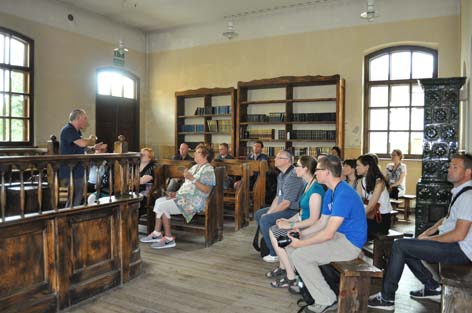Amy Gee is given a unique insight into concentration camp.
05 Aug 2014

MA Cultural History, Memory and Identity student Amy Gee was one of only 22 applicants to take part in the Auschwitz Birkenau State Museum’s annual summer school programme in July. Here she describes the experience:
This summer, at the beginning of July, I took part in a week-long study trip at Auschwitz Birkenau State Museum in Poland, organised by the International Centre for Education about Auschwitz and the Holocaust at the museum.
The theme of this years summer school, which has just completed its fifth year, was ‘History, Memory and Education’, and as a part-time student on the Cultural History, Memory and Identity Masters programme at Brighton, it seemed the perfect opportunity to develop some of the theories I have discovered about the relationship between history and memory at a site often talked about in my course lectures and seminars.
Applications for the summer school started in March and were advertised on the Auschwitz Birkenau State Museum website as part of their yearly educational programme. The summer school is open to anyone with an interest in Holocaust studies and education, from students to museum professionals, and with only 22 places available this year, I was thrilled to be offered a place. I looked forward to learning more about the Holocaust on site rather than in the classroom, and meeting people from all over the world with similar interests and professions.
The summer school was held in one of the old blocks within the main concentration camp. Lectures with leading Holocaust scholars from both the museum and the Jagiellonian University in Krakow were interspersed throughout the week with site visits, and we were guided around Auschwitz, Auschwitz Birkenau and the remains of the workcamp of Buna Monowitz, as well as the local town and many surrounding sub-camps and synagogues. It was really special to be allowed access to areas of the camps that are usually closed to the public and are rarely seen by people other than those who were there in the 1940’s or the current museum staff.
Members of staff from the Exhibitions, Collections, Conservation and Archive teams were available to talk to, and gave presentations on the work carried out by the museum. We were also taken on a visit to the old Jewish Quarter and the Jewish Ghetto in Krakow and were lucky to be there at the time of the annual festival of Jewish Culture in the city.
Having the opportunity to spend time learning about a place on the site itself was an invaluable addition to my Masters programme and allowed me the time to observe the behaviour of visitors and the activities that they take part in. I am particularly interested in what the site means to different people and why they choose to visit, and these are some of the questions I am interested in pursuing in my future studies.
The week was exhausting but brilliant and has posed as many questions as it has answered about the events of the Holocaust. It has also introduced me to other related topics and debates that I was previously unaware of, and I learnt as much from the experiences of some other members of the group as I did from the lecturers. It was an amazing experience and I feel privileged to have been able to take part.
I am very grateful to have been supported in my wish to attend the summer school by my course leader, Dr Lucy Noakes, and the Head of Humanities, Dr Paddy Maguire.
